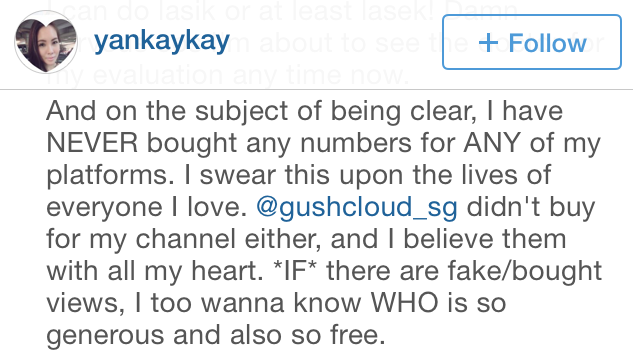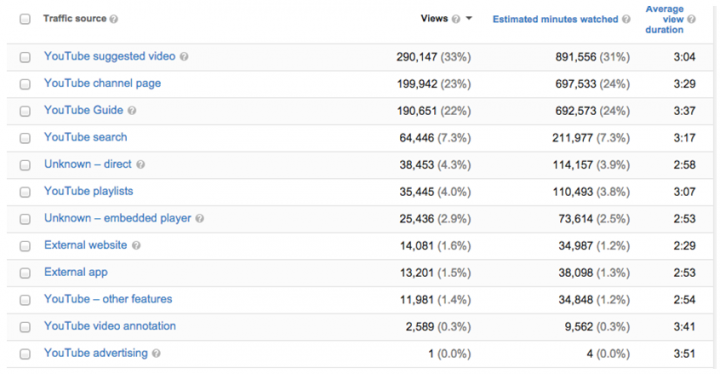Singapore startup Gushcloud rebuts Xiaxue’s accusations

Xiaxue is back.
Singapore-based blogger advertising network Gushcloud received an unpleasant Christmas surprise this morning. Xiaxue, a popular but polarizing blogging personality whose real name is Wendy Cheng, wrote a scathing takedown of Gushcloud and its allegedly dishonest practices. Xiaxue is affiliated to Nuffnang, a rival Singapore-based agency that she calls an “ethical company headed by ethical people.” She also owns shares in the company.
The article came out of a one-year investigation by Xiaxue in which she went to the extent of setting up a shell company and buying ads just to reveal Gushcloud’s practices. When contacted on December 23 by Tech in Asia, Gushcloud did not address the specific allegations, but issued a statement saying that the article is inaccurate.
“We think that the Blog Post was calculated to disparage and injure our reputation. The timing of the release of the Blog Post also speaks for itself. We are currently taking legal advice and reserve all our rights against Ms Cheng in relation to the Blog Post,” Gushcloud said in a Facebook post. The firm started a hashtag called #FaithInGushcloud to rally support. A day later, the company’s co-founder Althea Lim later issued a statement disputing one of Xiaxue’s claims. This was followed by a substantial response from CEO Vincent Ha addressing all the allegations.
Here is a summary of Xiaxue’s accusations, along with Gushcloud’s reply. Nuffnang also answered our queries.
Xiaxue: Gushcloud inflated its earnings to the press.
Gushcloud: It was an honest mistake.
The company told The Straits Times in November 2012 that its monthly revenue was S$170,000 (US$129,000), up from S$25,000 (US$18,900) in February that same year. However, after digging through publicly obtainable records, Xiaxue found out that that company’s annual revenue was more like S$396,005, or a monthly average of S$33,000. She writes in her typically acerbic tone:
Let’s just give them the benefit of doubt. They said that their revenue went up and that in February it was only S$25,000 per month. Let’s imagine that only in November, when this article is published, did their revenue suddenly become S$170,000 per month. From January to October it was S$25,000.
(S$25,000 x 10 months) + (S$170,000 x 2 months) = S$590,000
Tadah, STILL seems like inflation to me!!!
Ha says that 2012 was a poor year for Gushcloud due to business model changes, but things picked up towards the end. Most of its revenue made that year came in the last three months. An employee gave the wrong figures to the press and on hindsight, Ha admits that they should’ve issued a clarification earlier.
Xiaxue: Gushcloud gets bloggers to write posts that are disguised ads.
Gushcloud: We don’t force bloggers to do so. It’s up to their own volition.
Xiaxue sent Gushcloud a request through her shell company stating that she’d like an influencer to create an Instagram promotional post with no mention that it is an ad. The post went up, and “not only did [the influencer] not mention it’s a paid ad, she pretended that she stumbled upon the client by herself.”
Ha says Gushcloud leaves it up to bloggers to decide how they want to present the ads. The company does not contractually force influencers to mask ads. So, while some bloggers choose to disclose their sponsored posts, many do not. Explaining the leaked emails where the Gushcloud team asked bloggers to write copy such that they don’t look like ads, Ha says that these do not amount to a request to mask ads, but merely an attempt to write more naturally.
Gushcloud could mandate all bloggers disclose sponsored posts in the future. But for now, the present policy will continue:
“Since the industry is evolving, other agencies and bloggers are afforded the same flexibility on whether to label explicitly if a post is an advertorial, sponsored post, or paid ad,” Ha writes.
Xiaxue: Gushcloud inflates the pageviews of its bloggers.
Gushcloud: Nope.
Xiaxue inquired about the pageviews of certain bloggers and compared them with actual numbers by ordering banner ads and placing tracking codes on them. A comparison between the numbers of three bloggers showed a disparity of between five to ten times.
Ha points out that at the moment, they don’t have a way to automatically give clients the most updated blogger stats. This resulted in times when the stats given to clients became inconsistent. Nonetheless, he rubbishes the notion that Gushcloud inflates stats by five to ten times.
“The tracking link Wendy put on our influencer’s blog does not show the accurate numbers. There are many technical reasons for this. But between the influencer’s own Google Analytics and her tracking link (which uses an aspect of Google Analytics), we defer to the numbers from Google,” he says.
Ha then shows slides of bloggers given to clients, and compared them side-by-side with the Google Analytics pages. The differences were much less pronounced than what Xiaxue claims:

Xiaxue: Gushcloud may have bought YouTube views.
Gushcloud: You lie!
She compares her YouTube video with those of Gushcloud influencer Kay Kay (a former Xiaxue BFF by the way) and noticed some irregular patterns. While YouTube video views tend to taper off after a while, Kay Kay’s held steady. She also notices that Kay Kay’s video likes increased almost uniforming on certain days, and days with low likes were compensated the day after with a spike in likes.
Kay Kay wrote a post on Instagram denying Xiaxue’s claims.

In a personal blog post, Gushcloud co-founder Althea Lim has produced some statistics to dispute Xiaxue. She shows that most of the traffic from Kay Kay’s YouTube channel came from the channel itself and YouTube’s recommendation engine. This is significant because bots or click farms are more likely to chalk up the views using the exact URL, rather than go the indirect route.

She writes: “So I Althea Lim, in my personal capacity, say to you, Wendy Cheng, that your allegations against Gushcloud in your blog post are false. I Althea Lim, in my personal capacity, call you a liar.”
Xiaxue: Gushcloud is struggling financially and unable to pay influencers.
Gushcloud: We have been meeting contractual obligations.
Xiaxue points out that Gushcloud received a “qualified opinion” from the accountant, which suggests that its accounts were incomplete or did not follow best practices. This arose from S$233,444 in unaccounted operating expenses and S$150,252 paid to GushAd users that lack supporting documentation aside from bank transfer statements.
She further adds that the company had weak financials, making a loss of over S$900,000 and a profit of only S$56,216 in 2012. Finally, she suggested the firm may have owed influencers about S$351,000 in total, adding that they may have trouble paying bloggers as they only have S$16,215 cash in the bank.
The company recently put in a six-digit investment into Vulcan Post, a tech lifestyle publication.
Ha highlights that as a young company, records keeping was bound to be messy:
We expanded into many country offices a little bit too fast. In February 2012, we raised a seed round of US$500k. In March 2012, we set up a US office in San Francisco as well as in Malaysia. In doing so, we transferred a large amount of money that we raised to the US to setup bank accounts, put down payments for rental of apartments, an office, hire employees and pay consultants. We moved offices from co-working spaces to apartments to houses several times and many of the receipts and documentation for specific transactions were misplaced.
He adds that the company’s low cash reserves at times isn’t anything to worry about. It’s part and parcel of being a young service-based company who needs to pay out as fast as it collects money. Despite these challenges, it has managed to deliver on its contractual obligations.
He says: “We have been making regular payments to influencers for the last year and a half. Have we had issues with delays in payments to influencers? Certainly. Our influencers have given us the feedback that our policy to pay only after our clients have paid us is not favorable to them. In order to address their concerns and to provide a better service to our influencers, we raised financing and took on normal business loans in order to make payments to our sign influencers in 60 days or less after completion the campaigns. We have made many improvements in our payments system but we can also improve further.”
Ha asserts that 2014 has been a much better year for the company. The company is growing and it has raised more financing. The accounts will be released next year.
Nuffnang’s response

Nuffnang founder Ming Shen Cheo tells Tech in Asia that they do not engage in the practices that Gushcloud allegedly does. It has never engaged bloggers to write disguised ads.
“Nuffnang was the first in the industry more than five years ago to recommend heavily to our bloggers to mention ‘advertorial’ or ‘sponsored content’ in their posts. We enforce this as best as we can. This has been a position we have maintained throughout the years and something we have advocated on other channels, such as in the press,” says Cheo.
Nuffnang also ensures that it keeps blogger traffic data and rates regularly updated to account for spikes and drops in an influencer’s engagement stats. It claims to have never misrepresented these numbers.
On practices such as buying YouTube views and owing bloggers money for months, Cheo says that his company has never done those things.
“The outstanding debt owed to bloggers is confidential and I do not have the numbers off hand, however, this reflects amounts of money not cashed out from their accounts. Nuffnang and its associate companies maintain a healthy cash in bank balance that is more than sufficient to pay out bloggers whose payments are due,” he adds.
Finally, Cheo claims that Nuffnang has not exercised editorial influence on Xiaxue’s articles, and the same goes for other bloggers. “We trust her integrity and if these allegations are true, [we] will support her as our talent,” he says.
Both startups have been extensively covered by Tech in Asia in the past. Read more about Gushcloud and Nuffnang.
Gushcloud’s financials:
Gushcloud financial statements 2013
Update (December 24, 1pm): Gushcloud co-founder Althea Lim disputes Xiaxue’s claim that the company may have artificially inflated YouTube views.
Update (December 24, 7pm): Gushcloud CEO Vincent Ha responds to all of Xiaxue’s claims.
This post Singapore startup Gushcloud rebuts Xiaxue’s accusations appeared first on Tech in Asia.

 Yahoo Finance
Yahoo Finance 
